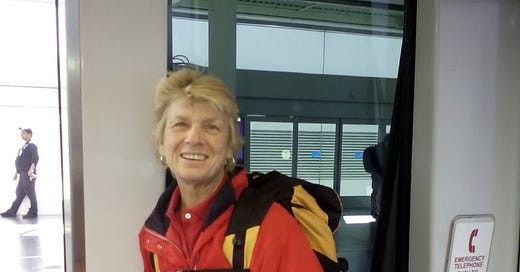The post Is Life Always Rosy? provoked a lot of comments and emails. But one of the comments on Facebook struck a real chord with me. And so I ask you, as you move abroad do you plan to experience or compare?
Let Me Be Clear
First, let me be clear … neither Denise nor I have regretted our decision to move to Portugal. We intended to spend 5 years here before returning to the States, and have now decided this is our home. I wrote the aforementioned post because I was asked by a reader to highlight the less positive aspects of the move. And I am not even certain I did. The items listed don’t reflect on Portugal but rather on how I have dealt with moving to Portugal. But isn’t that the case in all ways in which we see the world around us? Our perception is our reality. As the psychologists say:
… we believe what we perceive to be accurate, and we create our own realities based on those perceptions. And although our perceptions feel very real, that doesn’t mean they’re necessarily factual. - Well & Good
Compare
This brings me to the compare vs experience question. A Facebook commenter wrote:
For us, life is not an exercise in comparative analysis.. it is about experiences.
His comment framed the issue far better than I had. Sometimes when I talk with expats they seem to only be able to relate to their new life in comparison mode to their former life. Hey, I get it. I have often fallen into that trap: comparing pharmacies, the health care system, eating in a restaurant, gun and drug policies, even how trash is collected. When you move to a new country there are so many things that are “different”. It is only natural to compare it to the way the life that you knew before your move. But such comparisons often come with judgments…that one is better than the other.
I common complaint I hear from Americans in Portugal relates to convenience. I’ll hear them say, “With Amazon, I could have gotten it tomorrow and I wouldn’t have had to leave the house.” Yes, you are correct.
Another relates to bureaucracy. And yes, I complained about how long it took to get our ATM cards or the fact that multiple steps in a process were done sequentially rather than simultaneously. But I am convinced that part of the “burden” of this perceived bureaucracy relates to our ignorance of the process and occasionally our own hesitancy to embark on another unfamiliar process.
Experience
This leads me to how I hope we look at life in Portugal. It goes back to how we choose to travel. While we were never big cruisers (on a ship that is … I will admit to cruising a few bars when I was single) we once took a Baltic cruise. 7 cities or countries in 7 days? Did we go to Estonia? Yes. Did we experience Estonia? No.
And while immersive or experiential travel was a growing trend before the pandemic, our experience in Portugal suggests to me that you don’t really experience a country until you live there. While we spent a month in Thailand, we did not try to get the utilities turned on or have to file taxes. And it is possible to live in Portugal without completely immersing yourself. You can eat at McDonald’s, hire someone to act as your translater at the utility company, hire an attorney to exchange your Driver’s license, etc. Many expats do. (This is not a judgment…just an observation.)
And yes, from time to time we have availed ourselves of these services…e.g. we will use a Portuguese accountant to file our Portuguese taxes. But more and more we are finding comfort in living more like a local. An American visitor asked why there wasn’t a dryer in his Airbnb. I explained hanging out one’s clothes is typical in much of Europe… electricity is more expensive here. In fact, we have a washer/dryer in our Cascais apartment but don’t use the dryer part. When we met with a kitchen designer recently, she assumed we wanted a large American side-by-side refrigerator freezer. “No,” Denise responded, “I shop several times a week…a Euro-sized model will work just fine.”
I wrote before, we hope we travel with an open, curious mind. While America is a large, diverse country it represents only 5% of the world’s population. It is reasonable to assume that somewhere, among the other 95% someone figured out how to do things differently.
We hope we are bringing that same openness and curiosity to life in Portugal. And while I never thought I would quote Martha Stewart in this blog, “It’s a good thing.”
Next Week: our first holiday season in Portugal and lighting up the town.







My family doesn't live in Portugal; we are expats in Sweden. I compare and contrast constantly...mostly out of intellectual curiosity, but also because we moved here for a better life, and I need to convince myself that a better life is indeed what we are having. ;) Of course, my opinions are biased because I am human; but, I am also evidence-based and data-focused, and that helps ground my conclusions in some sort of reality. This process also helps me attempt to make sense of the world by studying how humans behave in various environments...but I am still utterly confused by humans, no matter where I live. :)
This is a great post. We tend to compare everything to our previous experiences rather than entering new experiences with a beginner's mind, particularly when the comparison is a negative one. A lot of Americans feel entitled. Having lived abroad in the past, I hope this time around, when I move to Portugal, I will have learned to observe more and compare less.